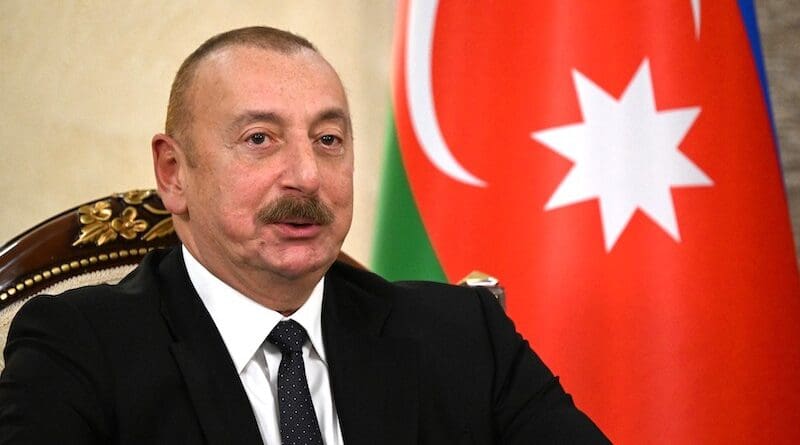Azerbaijani President Secures Coveted Invitation To Prestigious Munich Security Conference – OpEd
The congratulatory message and the invitation to Azerbaijani President Ilham Aliyev by German Chancellor Olaf Scholz on the February 7, 2024, snap elections victory, and to attend the Munich Security Conference (MSC) hold significant diplomatic importance.
In a congratulatory message to Azerbaijani President Ilham Aliyev on his re-election, Chancellor Olaf Scholz underscores his contentment to meet him “at the Munich Security Conference,” adding that Germany remains ready “to support Azerbaijan on the pathway of modernization and the strengthening of legal state structures”.
What does the congratulatory message & invitation to the MSC signal?
By extending the invitation shortly after President Ilham Aliyev’s victory in the polls, Chancellor Scholz is implicitly recognizing the political stability and legitimacy of the president’s leadership. This gesture signals acknowledgment of Azerbaijan’s democratic processes and the peaceful transition of power.
The invitation serves as a means to reinforce bilateral relations between Azerbaijan and Germany. By hosting President Aliyev at the MSC, Chancellor Scholz will also provide an opportunity for high-level dialogue and engagement between the two countries, fostering stronger diplomatic ties and cooperation on mutual interests, including security issues.
The MSC is a prestigious international platform for discussing pressing security challenges and fostering diplomatic dialogue. President Ilham Aliyev’s presence at the conference is to provide him with an opportunity to engage with world leaders, policymakers, and experts on a wide range of global security issues, including those relevant to Azerbaijan and the wider region.
Ilham Aliyev’s attendance at the MSC highlights Azerbaijan’s active role in international affairs and its commitment to addressing global security challenges. It provides a platform for Azerbaijan to showcase its perspectives, initiatives, and contributions to regional and international security efforts.
Participation in the MSC allows the Azerbaijani leader to engage in strategic networking with leaders worldwide, including potential partners for economic and security cooperation. It also offers opportunities for bilateral meetings and discussions on areas of mutual interest, such as energy security, counterterrorism, and regional stability as well as Azerbaijan’s growing weight in meeting the gas needs of certain European nations amid refusal from Russian gas.
Overall, the invitation extended to the Azerbaijani president soon after his electoral victory underscores the importance of diplomatic engagement, recognition of Azerbaijan’s role in global security, and the potential for strengthening bilateral relations between Azerbaijan and Germany.
With leading intellects from across the globe in security and diplomacy to converge upon Munich, anticipation crackles in the crisp Bavarian air. The historic cityscape, adorned with centuries of resilience and diplomacy, is now playing host to a modern-day forum of strategic discourse and geopolitical brinkmanship.
What is the MSC about?
The Munich Security Conference (MSC) is an annual international conference on security issues in Munich, Germany. It was founded in 1963 as the Wehrkundetagung (Defense Conference) and has since evolved into one of the most important gatherings in the international security and foreign policy sectors.
The conference provides a platform for high-level discussions and debates on current and future security challenges facing the international community. It brings together policymakers, experts, military officials, academics, and representatives from international organizations and civil society to exchange views, share insights, and foster cooperation on various security-related issues.
Topics discussed at the MSC often include geopolitical tensions, nuclear proliferation, terrorism, cyber security, conflict resolution, arms control, humanitarian crises, and other global security challenges.
The conference is recognized for its informal atmosphere, allowing participants to engage in frank and open dialogue on sensitive and complex security issues inside the hallowed halls of the MSC venue, where a symphony of languages fills the corridors, punctuated by the echoes of high-stakes debates and clandestine conversations – from seasoned statesmen to emerging leaders, a diverse array of voices, each poised to shape the contours of global security.
In addition to the main conference sessions, the MSC hosts various side events, such as panel discussions, workshops, and bilateral meetings, providing opportunities for networking and collaboration among attendees.
Amidst the labyrinthine discussions and meticulously crafted policies, a palpable tension lingers – a testament to the weighty issues at hand. Geopolitical fault lines intersect, and the delicate balance of power teeters on the brink, as participants navigate the complex web of alliances and adversaries. Amidst the solemnity of the agenda, there is a discernible undercurrent of camaraderie. Adversaries become acquaintances, and adversaries find common ground in pursuit of a safer, more stable world.
As the dawn of another MSC approaches, the world holds its breath, poised on the precipice of history, awaiting the outcomes that will shape the global security landscape for years to come. Overall, the MSC serves as a key forum for shaping international security policies and strategies, promoting dialogue and cooperation among nations, and addressing the most pressing security challenges facing the world today.
This article was published at Caliber.az

